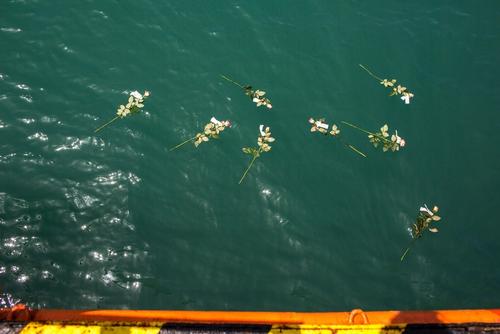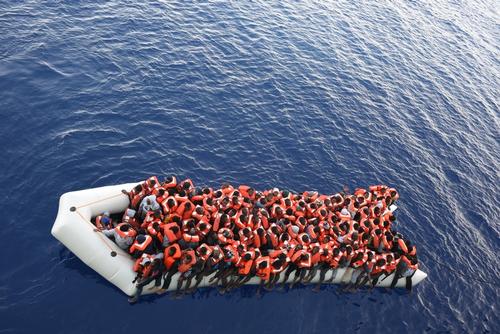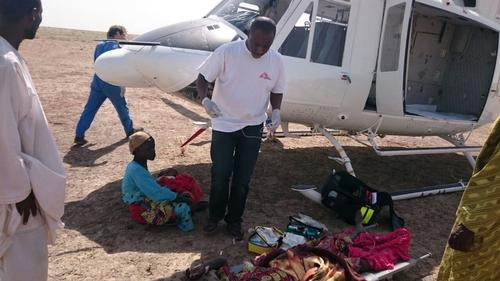- Dr Erna Rijnierse is an MSF doctor onboard the search and rescue vessel the MV Aquarius, which is run in partnership between MSF and SOS MEDITERRANEE.
- She gave the following account of a rescue operation in the central Mediterranean on 20 July, in which 209 people were rescued from two small boats in distress, and 22 people (21 women and one man) were found dead.
On Wednesday, we got a call from Italy’s Maritime Rescue Coordination Centre and were told that there was a helicopter doing a medical evacuation and we were needed to assist in a rescue. At that point we didn’t know that a navy vessel had disembarked about 48 people from a rubber boat. So a lot of things we only found out a bit later.
I and another team member had a bad feeling and it turned out that we were right.
So when we approached, the first thing we noticed was the silence. Normally, when you approach a boat the people wave and let you know that they are there, but this time, they were awfully silent. The other thing we noticed almost immediately was the very strong smell of fuel.
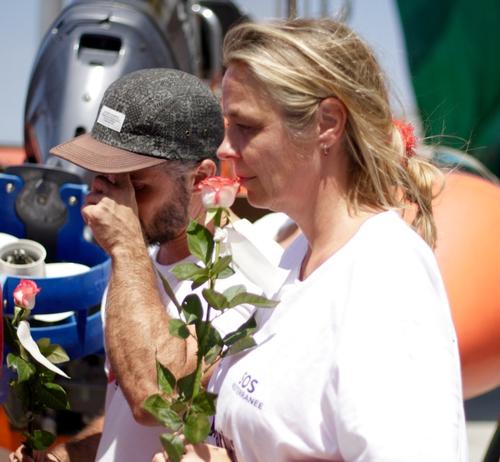
When we approached the boat, they told us there were dead bodies inside the boat. They didn’t tell us how many.
When we got close to the boat, we noticed that they didn’t have proper life jackets, so we distributed them immediately. What we didn’t know at that point was how many bodies were onboard.
I asked permission to get onto the boat. The water was up to my calves. The smell of fuel was incredible and there were strong smells of urine and other things. It was very hard not to step on a human body, but I wanted to make absolutely sure that the women – it was clear to me at that point that most of them were women – were really beyond the point of resuscitation.
I just did a quick assessment to make sure that the women were really dead. Some of them were already stiff, so rigor mortis had set in. It was clear that they didn’t die in the last few minutes and you could see in their eyes that the way they died, they were struggling.
From a medical point of view, it was clear that there was nothing we could do so I went back onboard our rescue boat to focus on the ones who did survive this ordeal. There were a lot of people onboard the boat suffering from stinging eyes, which was probably due to the gas or fuel. It became apparent that there had been a struggle on the boat. You could tell from the scratches on people's arms and legs, but also 10 people presented with human bite marks on arms, a person’s back, and also on lower backs and ankles. To me that’s somebody who has lain down flat on the floor and has been stacked upon, without being able to do anything about it. It’s horrific to imagine that scenario. It must have been chaotic. People were just staring with empty eyes into nothingness.
People onboard are severely traumatised by events, but it’s not only their journeys in the Sahara or their horrific stay in Libya. What they’ve encountered here has been beyond most people’s imagination. Later on, we recovered the bodies, which was not easy. What we do is take pictures of each and every individual. We give their estimated age and other details, to be handed over to the Italian authorities, but what’s really sad is that there’s only one person who has been positively identified.
They died an agonising death. You can see it in their faces. Some of them have protruding tonsils because of the suffocation process. It’s also difficult for people to recognise their loved ones when they are in that state.
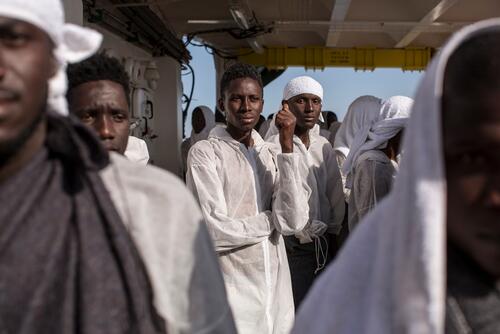
So we have one positive identification of a man who lost his wife in the incident. There is also a person who travelled with one of his relatives, but because of the state of the faces, he couldn’t even identify his family member and unfortunately doesn’t come from a country where his dental records or DNA or whatever could be used to identify the person. What we are hearing is that the girls were travelling from Nigeria. Some of them met along the way. We are hearing stories of them being at the bottom of the boat between the wooden floor and rubber bottom, gagging on swallowed dirty fuel and water.
Many of the girls were coming after having spent some time in detention, so were very weak to begin with. They didn’t eat or drink properly. How can you physically fight if you are weak? So it’s been horrible.
What we need to do is to focus on the ones who have survived and care for them. We’ve called in a psychosocial team from MSF in Italy who work on the shore and who are prepared for these sorts of situations and they will meet us tomorrow in Trappani, where we will hand over the dead bodies to the Italian authorities.
What is difficult and even disgusting to me is that these girls died a horrible death and only for because they have no other way to get to Europe. I find that appalling and very difficult to deal with. Of course it’s difficult to look face to face at a dead person but it’s even more difficult when you have to try and give some sort of identification to a girl you will never talk to. You will never know their history or who will miss her. Because you will have no way of identifying her, that makes it even more personal to me.
I was furious yesterday. I was angry at the policies that keep everything at arm’s length. These girls could have bought an airplane ticket and had a very safe, comfortable journey and still have paid half the price that they paid for this doomed crossing. They shouldn’t have to cross the desert or be in forced prostitution or whatever situation they find themselves in, then have to board in the middle of the night an unfit vessel to then drown in the sea because they can’t do it any other way, and that whole sequence makes me furious. And at the same time, I’m super sad because these people have committed no crime but to cross the sea. They were not sick. They were normal people with their whole lives ahead of them.



